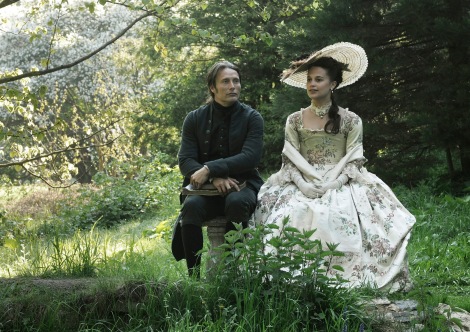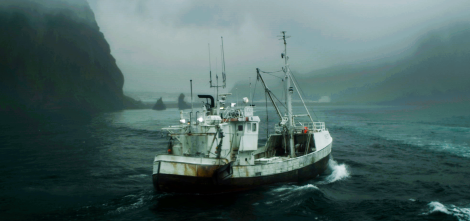David Mermelstein is an AwardsLine contributor. This article appeared in the Dec. 12 issue of AwardsLine.
Fairly or not, European films are widely considered more serious than their American counterparts. Certainly the movies eligible for the best foreign film Oscar this year fit the mold. Several make struggle a central theme, doing so in varied but consistently engaging ways.
Pablo Larrain’s No, from Chile, examines the 1988 plebiscite forced on General Augusto Pinochet, the result of which marked the beginning of the end of his dictatorship. In the film, a gifted marketing executive, Rene (Gael Garcia Bernal), must choose between middle-class comforts and his conscience—a choice complicated by his family’s ties to leftist politics. His boss (Alfredo Castro), who is firmly in league with the pro-Pinochet forces, plays Mephistopheles in this situation, reminding Rene, in no uncertain terms, that the creature comforts he enjoys are by no means guaranteed. Complicating matters are Rene’s shaky relationship with his politically engaged wife, Veronica (Antonia Zegers), from whom he is already separated. All of which leads to the film’s central question: What price bravery?

Chen Kaige’s Caught in the Web, China’s contender this year, essentially flips the individual-versus-society question as it examines the struggles faced by Ye Lanqiu (Gao Yuanyuan), a mild and attractive executive assistant who is given a grim prognosis of advanced lymphatic cancer. That dire news triggers a chain of events in which the stunned secretary acts rudely on a public bus, and her behavior, captured on a young reporter’s cell phone, creates a cause célèbre, catapulting her to national vilification as “Miss Sunglasses.” This double blow of fate and ostracism is compelling, but Chen is more concerned with turning the lens around, from the individual onto Chinese society. There, he suggests, obsession with technology has reduced public empathy to everyone’s detriment.

Based on real incident, The Deep, from Icelandic filmmaker Baltasar Kormakur, relates the incredible story of a simple but happy fisherman named Gulli (Olafur Darri Olafsson) who finds himself the sole survivor of a sinking ship. Battling nature and the guilt he feels at being unable to save his crewmates, he makes an improbable bid for survival, defying long odds and swimming to safety. Yet doubts confront him once he does, with people—especially those in authority—refusing to believe his death-defying accomplishment. Then, after confirmation of his experience, he is subjected to medical tests, in hopes of finding a scientific basis for his fortitude and good fortune, so unwilling is the establishment to accept extraordinary actions from such an ordinary man.
Struggles of a strictly private nature lie at the heart of Michael Haneke’s Amour, a French-language film flying the Austrian flag. Centering almost entirely on an aged couple (Jean-Louis Trintignant and Emmanuelle Riva) who must suddenly come to grips with infirmity and—by implication—mortality. Though the much-lauded and singular Haneke would not seem an obvious choice for such a picture, his utter lack of sentimentality pierces the essence of what it means to grow old. Here, Riva must contend with the ravages of a stroke while Trintignant watches his life partner disintegrate before him, powerless to do much more than offer limp comforts.
Transporting viewers to 18th-century Denmark, Nikolaj Arcel’s A Royal Affair uses a historical romance between King Christian VII’s wife, Caroline Mathilde (Alicia Vikander), and the king’s physician-cum-chancellor, Johann Streunsee (Mads Mikkelsen), to explore the challenges facing enlightened nobles attempting to improve a backward nation. Beneath the rustle of damask and flickering candlelight, Arcel asks eternal questions regarding a nation’s leaders and their responsibilities—questions made all the more pointed when the populace is too ignorant to embrace its own interests. This particular tale did not end well for those involved, their struggles and sacrifices made apparently in vain. But history takes the long view, which Arcel clearly appreciates in his touching coda.
Said Ould Khelifa’s Zabana! also takes a page from history to appreciate the short life of the Algerian freedom fighter Ahmed Zabana, whose execution helped bring about Algeria’s war of independence from France. And though Australia’s entry for an Oscar this year, Lore, is fictional, its German-language story is grounded in a historical subject that film lovers never seem to tire of: World War II and its consequences. In this case, the protagonist is teenage girl whose parents were ardent Nazis.
Such films as these aren’t are always shortlisted, let alone award winners, of course. Last year’s outstanding A Separation, from Iran, delved deeply into matters of perception and truth, but on an intimate scale. Still, the Academy clearly has a soft spot for foreign films that tackle big issues in which struggle figures prominently. Haneke’s The White Ribbon (2009), from Germany, is a perfect example, with its implicit societal indictment. And so is Florian Henckel von Donnersmarck’s The Lives of Others (2006), also from Germany. Both contend with man’s eternal battle to come to terms with both himself and the society in which he lives. And these are struggles to which we can all relate.

